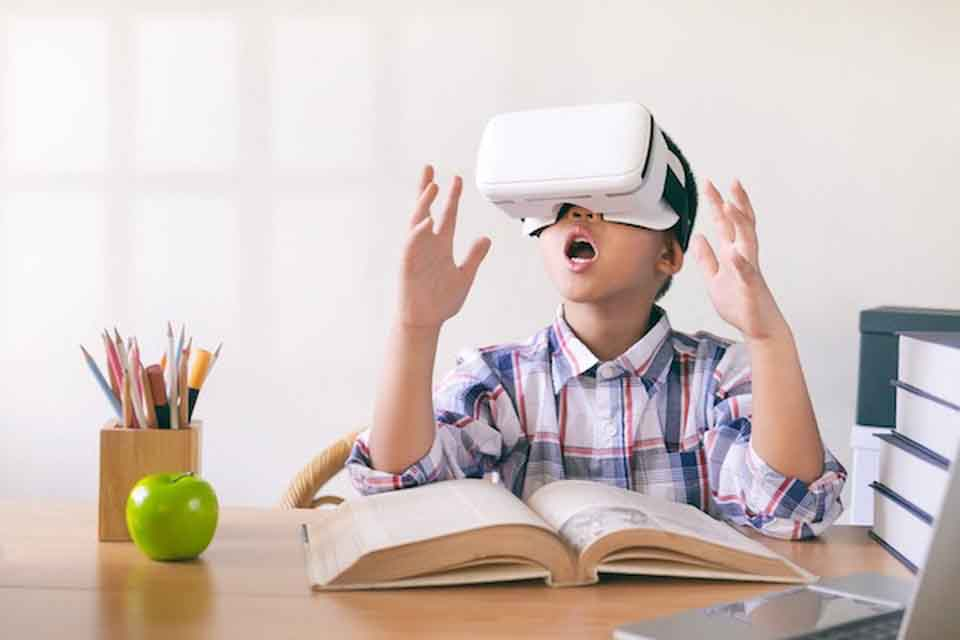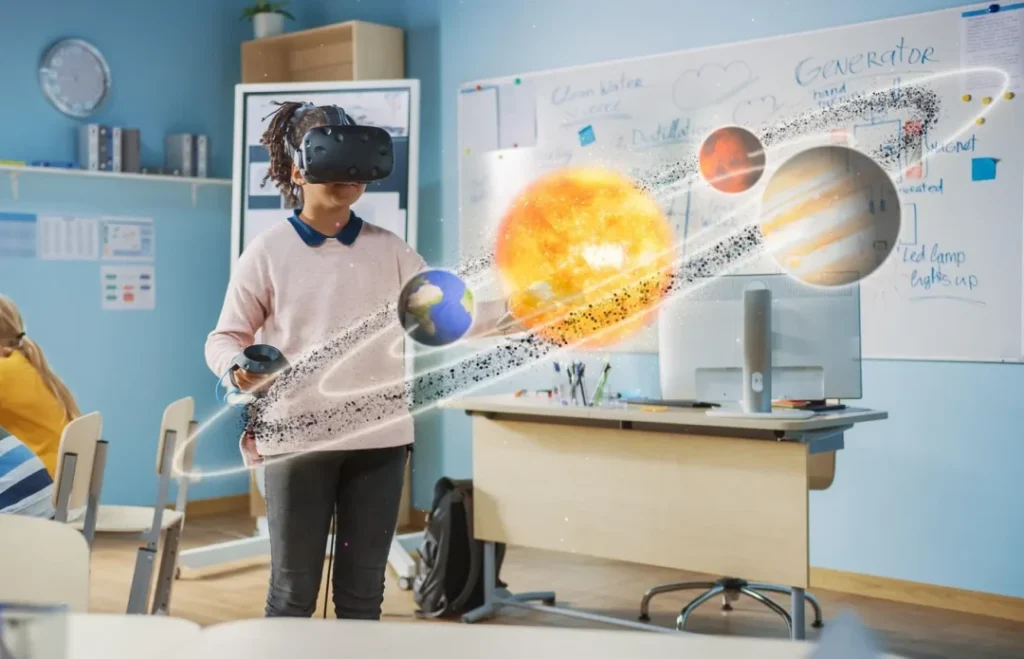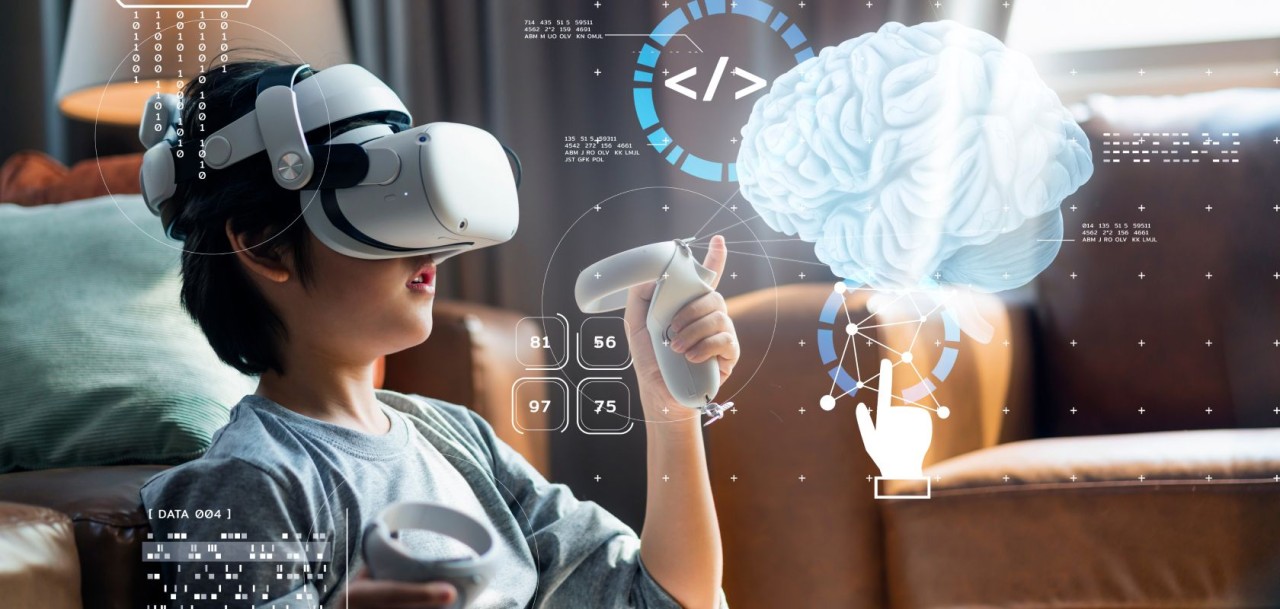AR and VR Applications Revolutionising Kuwait’s Education System for a Smarter Future Kuwait’s education scene is on the verge of a thrilling revolution. With the integration of Augmented Reality (AR) and Virtual Reality (VR), schools, colleges, and vocational training centres are embracing immersive learning experiences that empower students and instructors alike.
Immersive Classrooms Make Learning Lively
Imagine kindergarten children in Kuwait learning the English alphabet through AR apps when they point a tablet at a letter, a 3D character pops up, interacts, and invites them to tap or speak. Studies from Kuwait’s own classrooms show that this approach significantly boosts both engagement and test performance compared to traditional methods. Students interact more and retain information longer.
In higher grades, AR brings complex ideas to life molecules float in space during chemistry, geometry shapes hover in real environments, and historic events unfold around learners. These stunning visuals create emotional and cognitive connections that spark curiosity and deepen understanding.
Simulations and Virtual Training in Vocational Skills
Institutions like Kuwait Oil Company and Kuwait National Petroleum Company, through partnerships with firms such as EON Reality, now deliver safety and technical training in virtual 3D environments. Students and employees can practice operating heavy machinery or responding to emergencies without any risk. This immersive and safe environment enhances comprehension and readiness.
In specialised colleges such as the Public Authority for Applied Education and Training and Kuwait Technical College, VR simulations are used for vocational education teaching students to troubleshoot equipment, work on electrical systems, and navigate industrial processes. This prepares a workforce that is skilled, confident, and industry ready.
Virtual Field Trips and Cultural Journeys
AR and VR are redefining field trips in Kuwait. Whether exploring ancient heritage sites, diving into marine ecosystems, or strolling through global museums, students can experience learning beyond school walls. These simulations are especially valuable in remote or urban contexts where access to physical travel is limited.
Virtual visits to Bait Bader, Bait Dickson, and Mobarakiah Souk offer deep cultural insights, all via 360 VR tours received through student headsets. These immersive experiences nurture identity, pride, and global perspective simultaneously.

Inclusive and Personalised Education Experiences
AR and VR foster exclusivity by catering to different learning needs. For children with special needs, AR based games and visual aids offer structured, interactive environments tailored to their pace and style. This approach improves learning accessibility and individual progress.
AI powered VR platforms also personalise learning journeys adjusting difficulty, pace, and content based on real-time student responses. These smart systems ensure that each learner receives the support and challenge they need most.
HR Training and Higher Education Innovation
At the Kuwait College of Science and Technology, a 5G simulation lab developed with global tech partners offers VR based training environments for engineering and ICT students. This high-tech centre allows learners to build, test, and operate systems in real-time virtual spaces all linked to advanced connectivity infrastructure for heightened realism.
Meanwhile, executive and vocational training centres deploy AR content that individuals can access on any device. They can generate context sensitive interactive modules instantly, enabling dynamic training for professionals and educators.
Policy Level Support and Ethical Integration
In April 2025, Abdullah Al Salem University hosted a high-profile summit titled “Learning in the Age of Innovation”. Education leaders strongly advocated for VR and AI in schools and universities with clear emphasis on data privacy, ethical frameworks, and equitable access.
Recommendations included launching pilot VR AR initiatives aligned with curricula, ensuring all students can access immersive tools, and developing flexible policies that evolve with technology. Cross institution collaboration and incubators to turn research into local educational products were key themes.

Teacher Empowerment and Enriched Curriculum
Teachers are receiving hands on training in AI and AR VR integration, supported by workshops and professional development courses in Kuwait. This ensures educators can design impact VR lessons, manage VR classrooms, and blend interactivity into their daily practice.
Curriculum development now includes immersive modules across STEM, languages, social studies and vocational pathways, providing high engagement learning while reinforcing core academic content.
Youth Innovation and Student Led Creativity
Student led innovations in Kuwait are thriving projects involving chatbots, VR tours, and AI learning tools regularly win national innovation awards. Universities and tech hubs now incubate student led educational startups, enabling youth to prototype AR VR tools that solve real classroom challenges.
This nurtures a generation of creative thinkers who not only consume technology but also build it for their peers and future learners.
Challenges and Thoughtful Solutions
While AR and VR promise so much, Kuwait faces challenges equitable access across different schools, ensuring all students have devices and connectivity, training enough teachers, and safeguarding student privacy in digital systems.
Education leaders are addressing these by establishing standards for data security, creating inclusive access initiatives, and offering ongoing teacher training to build confidence and fluency in immersive tools.
A Bright Immersive Future Ahead
Kuwait’s education system is quickly evolving into an immersive, student led, tech savvy ecosystem. AR and VR are no longer futuristic fantasies they are powerful tools making learning active, accessible, and engaging.
Everywhere from kindergartens to industry training sites, the new wave of education integrates simulation, collaboration, personality, and creativity. As long as ethical considerations, teacher empowerment, and inclusive access remain priorities, Kuwait is poised to lead the region in immersive education.
Do follow Gulf Magazine on Instagram.
Also Read – Digital Skills Training for Oman’s Youth Unlocks Limitless Opportunities



